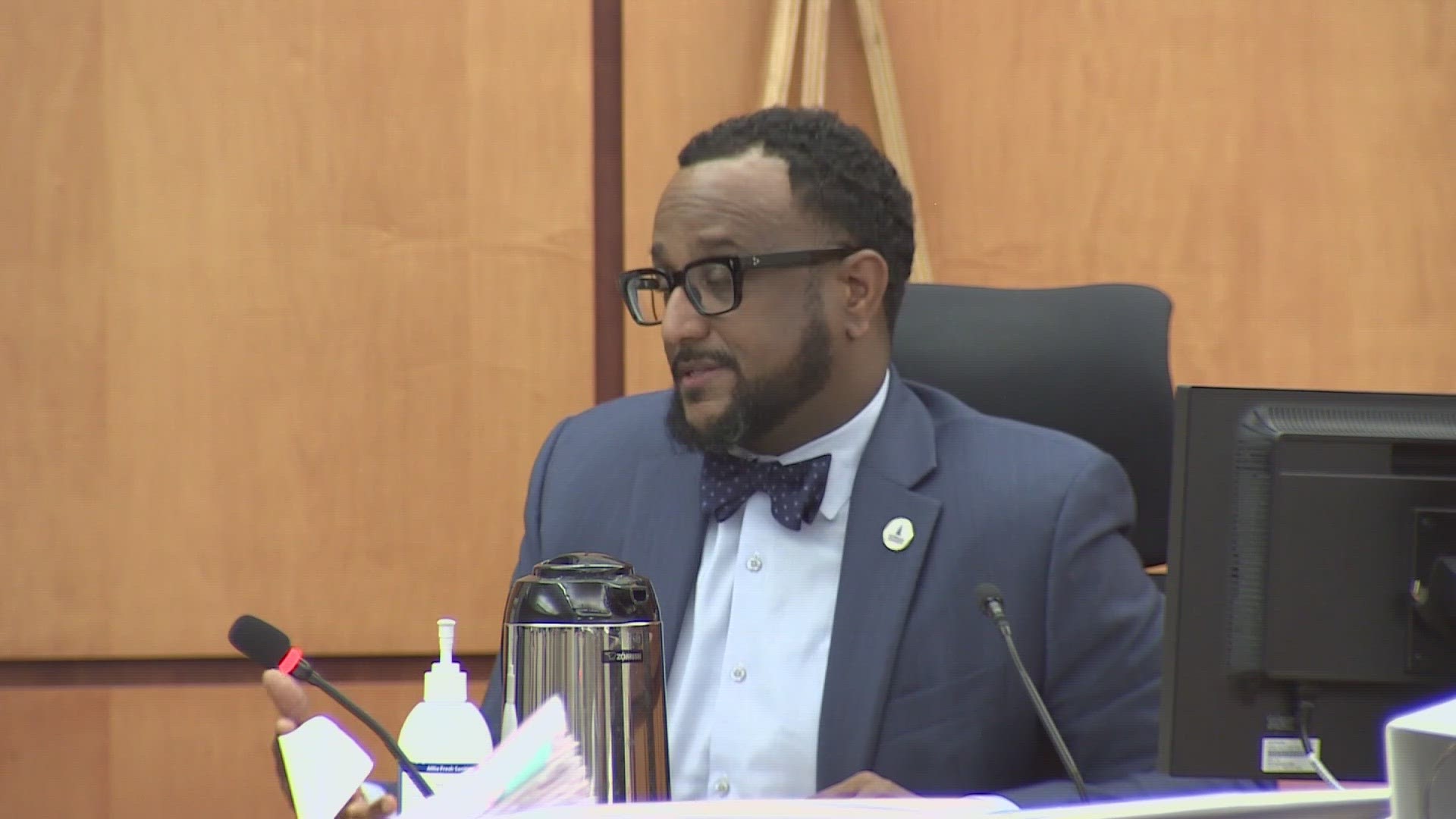TACOMA, Wash. — An expert in forensic pathology testified Monday in the ongoing trial of three Tacoma, Washington, police officers charged with the death of Manuel Ellis that Ellis likely would have lived if not for the officers’ actions to restrain him.
Three Tacoma police officers face charges in the death of Ellis, a 33-year-old Black man who died in police custody in March 2020.
Officers Christopher Burbank and Matthew Collins are charged with second-degree murder and first-degree manslaughter. Officer Timothy Rankine is charged with first-degree manslaughter.
Dr. Roger Mitchell, who first took the stand Thursday, said the way Ellis was restrained by the officers is ultimately what led to his death.
Mitchell has been a practicing forensic pathologist since 2007 and is currently the chair of pathology and the chief medical officer for ambulatory care at Howard University. His experience spans over a decade overseeing thousands of death investigations in New York, Washington D.C., New Jersey and Texas.
In addition to his duties, Mitchell teaches medical students and residents, including lessons about hypoxia and its effects.
On Monday, Mitchell was asked to expand on his findings about how Ellis died: mechanical asphyxia due to violent subdual and restraint by law enforcement. Mitchell said that because Ellis could not get enough oxygen in his body after expending energy in the altercation with police officers, his heart began to fail.
Mitchell noted that in the prone position that Ellis was placed in, it would have been harder for him to breathe and impacted his heart's ability to beat properly, with the added complication of the handcuffs and the hobble restraint that was placed on Ellis' legs. In a prone position, the diaphragm can be compressed by the stomach, limiting breathing, and giving the heart less room to pump inside the chest cavity. Ellis' ability to breathe and for his heart to pump would have also been impacted by the officer who was applying pressure to his back, Mitchell said.
Mitchell said when the heart doesn't get enough oxygen, it begins to slow down in an attempt to use less. Mitchell noted when medics arrived on the scene, Ellis' heart rate was slowing and eventually stopped, but his heart did still register electrical activity - something that is associated with respiratory arrest and hypoxia.
Mitchell listed three contributing causes of death: the spit hood that was placed over Ellis' face, the level of methamphetamine in Ellis' body and also Ellis' enlarged heart.
Defense counsel Brett Purtzer questioned Mitchell about how Ellis could have survived such a large dose of methamphetamine in his body. Mitchell said there is a range of doses that can be fatal and he disagreed with the medical examiner that the methamphetamine in Ellis' system could be argued to be the primary cause of Ellis' death.
Mitchell did agree when asked by the defense, that he cannot say absent the enlarged heart and the methamphetamine in Ellis' system that he still would have died after the altercation with Tacoma police officers.
The defense noted that at the time Ellis was in hobble restraints, Collins and Burbank were elsewhere giving their statement about what happened during the altercation to a police sergeant who had responded to the scene. The defense also noted that Ellis' hyoid bone was still intact, which is a U-shaped bone in the throat that can get crushed or fractured in a chokehold.
During much of the testimony in the afternoon, the defense focused on Ellis' underlying health conditions and meth use. Defense attorneys pointed out that Ellis had previously complained of shortness of breath in situations that didn't involve law enforcement and had underlying heart issues.
However, when asked by prosecutors if knowing of Ellis' underlying health conditions changed Mitchell's opinion on Ellis' cause of death, he said no. He said the altercation with police officers and alleged restraint compounded his baseline health - though there is no definitive answer on whether Ellis would have died regardless.
Defense counsel Jared Ausserer brought up Mitchell's advocacy work, specifically centered around in-custody deaths. Mitchell describes himself as a physician-advocate and has a podcast related to the topic of in-custody deaths, arguing there needs to be a public-health approach to those investigations.
Ausserer also asked Mitchell how much he is getting paid for his participation in the investigation and trial. Mitchell estimated that by the time he is finished, he will have been paid around $35,000-$40,000 by the state.
The trial is expected to last between eight and 12 weeks. Jury deliberations are anticipated to begin Dec. 4.
Background on the case
On March 3, 2020, Ellis was walking home when he stopped to speak with Tacoma Police Officers Burbank and Collins, who were in their patrol car, according to probable cause documents.
Witnesses said Ellis turned to walk away, but the officers got out of their car and knocked Ellis to his knees. All witnesses told investigators they did not see Ellis strike the officers.
Other responding officers told investigators that Burbank and Collins reported Ellis was “goin’ after a car” in the intersection and punched the patrol car's windows.
Witness video shows officers repeatedly hitting Ellis. Collins put Ellis into a neck restraint, and Burbank tasered Ellis’ chest, according to prosecutors.
Home security camera footage captured Ellis saying, “Can’t breathe, sir. Can’t breathe."
Rankine, who was the first backup officer to arrive, applied pressure to Ellis' back and held him in place while Ellis was "hogtied" with a hobble, according to documents.
When the fire department arrived, Ellis was “unconscious and unresponsive,” according to documents.
The Pierce County Medical Examiner ruled Ellis' death a homicide. According to the autopsy report, Ellis also had a fatal amount of methamphetamine in his system.
KING 5 will stream gavel-to-gavel coverage of the trial from opening to closing statements. Follow live coverage and watch videos on demand on king5.com, KING 5+ and the KING 5 YouTube channel.

